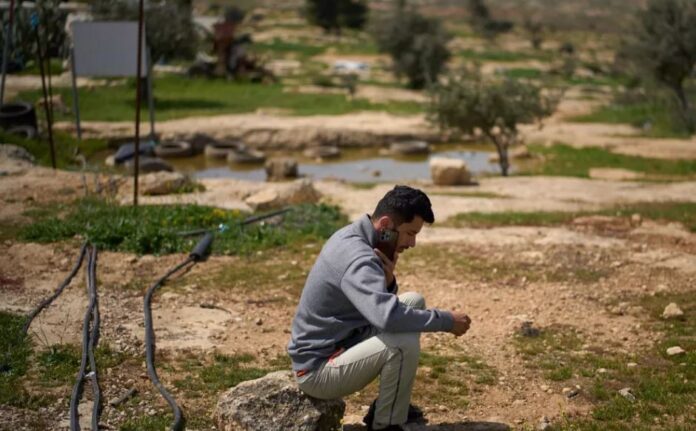Susiya, West Bank – Hamdan Ballal, the Palestinian co-director of the Oscar-winning documentary No Other Land, has spoken out for the first time since his release from custody following a brutal attack by illegal Israeli settlers and subsequent arrest by Israeli forces. The incident, which unfolded on March 24, 2025, in the village of Susiya in the occupied West Bank, has sparked widespread outrage and drawn international attention to the escalating tensions in the region.
Ballal, who shared the Best Documentary Feature Oscar earlier this month with fellow directors Basel Adra, Yuval Abraham, and Rachel Szor, was reportedly assaulted by a group of masked settlers outside his home. Eyewitnesses, including activists from the Center for Jewish Nonviolence, described a violent scene in which settlers beat Ballal, leaving him with injuries to his head and stomach. His wife, Lamya Ballal, recounted hearing her husband scream, “I’m dying!” as she watched from inside their home, where she sheltered with their three children. She alleges that soldiers arrived not to intervene but to detain her husband, blindfolding and handcuffing him before taking him away in a military vehicle.
Also Read: Russian Drone Strike on Dnipro Leaves Four Dead, 19 Injured
“They beat him in front of our house while filming the assault,” Lamya told reporters, her voice trembling with emotion. “After the Oscar, they’ve come to attack us more. It’s revenge for showing the world what they do to us.”
Ballal was held overnight at a military base, where he claims he endured further mistreatment. “I was blindfolded for 24 hours,” he told journalists after his release on March 25. “They forced me to sleep under a freezing air conditioner. I heard the soldiers laughing about me, saying ‘Oscar,’ mocking me. All my body is in pain.” Bruises marked his face, and blood stained his clothes as he emerged from a police station in the Kiryat Arba settlement, accompanied by two other detained Palestinians.
The Israeli military has offered a conflicting account, asserting that Ballal and two others were detained for allegedly throwing rocks at security forces during a “violent confrontation” with settlers. Witnesses and Ballal’s attorney, Lea Tsemel, vehemently deny these claims, asserting that he adhered to principles of nonviolence. Tsemel reported that her clients received only minimal medical care for their injuries and that she was denied access to them for hours after their arrest.
The attack occurred shortly after Susiya residents broke their Ramadan fast, with settlers storming the village, damaging property, and targeting Ballal’s home. A water tank was punctured, and a car belonging to the family had its windows shattered, leaving a bloodstain outside their door as a grim testament to the violence. Basel Adra, Ballal’s co-director and a prominent activist in the Masafer Yatta region, called the incident a deliberate act of retribution. “Since the Oscar win, the attacks by settlers and Israeli forces have surged,” he said. “Nobody can stop these pogroms. The soldiers are here to help the settlers, not us.”
No Other Land, a joint Palestinian-Israeli production, chronicles the forced displacement of Palestinian communities in Masafer Yatta by Israeli authorities. The film’s global recognition—including its Academy Award win on March 2—has amplified the voices of those resisting occupation, but it has also drawn ire from Israeli officials and settlers. Israel’s Culture Minister, Miki Zohar, condemned the Oscar victory as “a sad moment for the world of cinema,” accusing the filmmakers of distorting Israel’s image.
International human rights groups, including Amnesty International, have called for accountability, labeling Ballal’s detention a case of “forced disappearance” following the settler assault. Meanwhile, the documentary community has rallied in support, with filmmakers like Roger Ross Williams and Alex Gibney co-signing a petition demanding his release, which garnered over 7,000 signatures in a single day.
As Ballal recovers in Hebron, where he was taken for medical treatment, the incident underscores the volatile reality faced by Palestinians in the West Bank—a region where settler violence has spiked since the onset of the Israel-Hamas war in 2023. For Ballal and his family, the Oscar win has become both a beacon of hope and a lightning rod for reprisal, highlighting the steep personal cost of exposing their story to the world.
Key Points: Palestinian Oscar Winner Hamdan Ballal Assaulted and Arrested
- Incident Overview: Hamdan Ballal, Palestinian co-director of the Oscar-winning documentary No Other Land, was attacked by illegal Israeli settlers and arrested by Israeli forces on March 24, 2025, in Susiya, West Bank, shortly after breaking his Ramadan fast.
- Assault Details: Masked settlers beat Ballal outside his home, injuring his head and stomach. His wife, Lamya, witnessed the assault, hearing him scream, “I’m dying!” as settlers filmed the attack. Property damage included a punctured water tank and a smashed car.
- Arrest and Detention: Israeli soldiers detained Ballal, blindfolding and handcuffing him. He was held for 24 hours, alleging mistreatment including being mocked as “Oscar” by soldiers. Released on March 25, he showed visible bruises and bloodstains.
- Conflicting Accounts: The Israeli military claims Ballal threw rocks at forces during a “violent confrontation,” a charge denied by witnesses and his attorney, Lea Tsemel, who insists he remained nonviolent. Tsemel reported limited medical care and restricted access to her clients.
- Context of Retribution: The attack followed No Other Land’s Oscar win on March 2, 2025, which documents Palestinian displacement in Masafer Yatta. Co-director Basel Adra called it revenge for the film’s global exposure, noting increased settler and military aggression.
- Film’s Impact: The documentary, a Palestinian-Israeli collaboration, has faced backlash from Israeli officials like Culture Minister Miki Zohar, who criticized its Oscar success as misrepresenting Israel.
- International Response: Amnesty International labeled Ballal’s detention a “forced disappearance,” while filmmakers like Roger Ross Williams supported a petition for his release, gaining over 7,000 signatures. Human rights groups demand accountability for settler violence.
- Ongoing Tensions: The incident reflects rising settler attacks in the West Bank since the 2023 Israel-Hamas war, underscoring the personal risks Ballal faces for highlighting Palestinian struggles.



